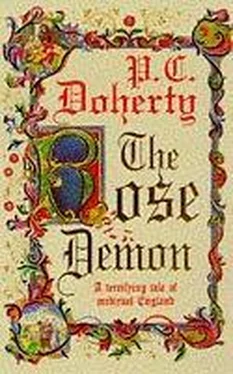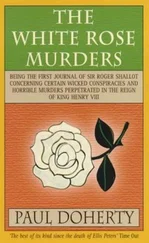Paul Doherty - The Rose Demon
Здесь есть возможность читать онлайн «Paul Doherty - The Rose Demon» весь текст электронной книги совершенно бесплатно (целиком полную версию без сокращений). В некоторых случаях можно слушать аудио, скачать через торрент в формате fb2 и присутствует краткое содержание. Жанр: Исторический детектив, на английском языке. Описание произведения, (предисловие) а так же отзывы посетителей доступны на портале библиотеки ЛибКат.
- Название:The Rose Demon
- Автор:
- Жанр:
- Год:неизвестен
- ISBN:нет данных
- Рейтинг книги:5 / 5. Голосов: 1
-
Избранное:Добавить в избранное
- Отзывы:
-
Ваша оценка:
- 100
- 1
- 2
- 3
- 4
- 5
The Rose Demon: краткое содержание, описание и аннотация
Предлагаем к чтению аннотацию, описание, краткое содержание или предисловие (зависит от того, что написал сам автор книги «The Rose Demon»). Если вы не нашли необходимую информацию о книге — напишите в комментариях, мы постараемся отыскать её.
The Rose Demon — читать онлайн бесплатно полную книгу (весь текст) целиком
Ниже представлен текст книги, разбитый по страницам. Система сохранения места последней прочитанной страницы, позволяет с удобством читать онлайн бесплатно книгу «The Rose Demon», без необходимости каждый раз заново искать на чём Вы остановились. Поставьте закладку, и сможете в любой момент перейти на страницу, на которой закончили чтение.
Интервал:
Закладка:
‘Aren’t they pleased?’ Matthias asked. ‘That Granada is Spanish and Catholic?’
‘Granada was an island in itself,’ Ratcliffe answered. ‘A city of opulence, luxury, carefree in all matters. If it hadn’t been for a group of fanatics, Boabdil would have surrendered as soon as the Catholic standards appeared over the hill. Granada is a place, Matthias, where Christian, Jew, Moor, as well as a few faiths you’ve never even heard of, lived in easy amity. Now all has changed. Granada is Catholic, the Santa Hermanda, the Inquisition and, above all, Tomas de Torquemada are here. Rumours are rife. Ferdinand and Isabella are pragmatic: they need the Moorish craftsmen and they depend heavily upon the Jewish bankers.’
‘But Torquemada?’ Matthias asked.
‘Ah yes.’ Ratcliffe lowered his voice and made a sign to Matthias to do so. He stared round the garden. ‘Be careful, Matthias. They say that Torquemada even pays the birds, the mice and the rats to bring him information. Torquemada is a zealot. He not only sees a united Catholic Spain but, as I have said, a kingdom free of Moor and Jew. He has already accused Ferdinand and Isabella of selling the Church, like Judas sold Christ, for the sake of money and peace.’
‘He said that!’ Matthias exclaimed.
‘Torquemada and his Inquisition answer to no one but God. Even the Pope in Rome fears him. He has Isabella’s soul in the palm of his hand and, like a child with a toy, Torquemada knows how to use it!’
‘And?’
Ratcliffe sipped at his wine, savouring its rich sweetness. ‘It’s better than the vinegar we’ve got in camp,’ he observed. ‘Lord Rivers has been given the honour of accompanying certain nobles from Granada to Madrid. He has asked for the company of St Raphael to join him. I have agreed. We leave tomorrow morning before first light.’ He knocked the dust from his jacket. ‘If you wish, and I advise you to do so, you may come with us.’
Matthias stared across the garden. Somewhere in the tavern a man was singing a lusty, merry song. Matthias realised he was in danger, that he was under surveillance by the Holy Brotherhood. Yet he didn’t really care. Those dying words of Yarfel showed that, whatever he did, he was like a swimmer in a fast-flowing river: however hard he struggled, the current would always have its way. He closed his eyes. He’d always been fleeing: from Oxford, from Barnwick, from Scotland, from London, from St Wilfrid’s, from Emloe’s men. He opened his eyes.
‘I’ll stay,’ he declared.
‘In which case,’ Ratcliffe put his cup down and stood up, ‘I suggest you find quarters in the city here.’ He pointed to the cross the Spanish Queen had sent Matthias. ‘You have the royal warrant to do what you want and go where you will. I shall arrange for whatever the company owes you to be left in trust with Hidalbo, a Spanish merchant. He has a house just within the gateways of Holy Faith city, near the sign of the Bull.’
Matthias got to his feet. ‘I don’t want it, Edgar.’ He saw the surprise in the man’s face. ‘My horse is stabled in the Alhambra. I paid a groom to guard that and my saddlebags. What I want, what I need, is in them: the rest you can keep.’
Matthias liked this English knight but he knew any hope of camaraderie, of a deeper, more lasting friendship was gone for ever. He stretched out his hand.
‘I shall not return tonight. God be with you, Sir Edgar.’
‘Is that how it is, Matthias?’
‘That’s how it is, Edgar. You are a good soldier, a loyal friend. In the last few months you have been my brother. However, I cannot tell you about my past or what haunts me and it’s best if I continue alone. The company of St Raphael do not need me and I do not need them.’
Sir Edgar clasped his hand and embraced him. They exchanged the kiss of peace. Sir Edgar left, walking purposefully across the garden and into the tavern without a backward glance.
Matthias sat down on the bench and picked up his wine cup. He stared down at Sir Edgar’s, fighting hard against the self-pity which threatened to engulf him. He closed his eyes.
‘Why?’ he whispered. ‘Why don’t you come, Rosifer. Why not now?’
The sun was warm on his face. Matthias leant back and dozed. His mind slipped into dreams of Barnwick and Rosamund: such dreams occurred frequently, more insistently. He felt himself shaken and opened his eyes. The little boy was staring at him sadly, pointing to his cup and chattering. Matthias shook his head.
‘No, I’ve had enough wine.’
He pressed a coin into the boy’s hand, got to his feet and went back into the courtyard to the Alhambra where he collected his horse. The city was now packed with soldiery but their mood was happy. Archers, wearing the silver cross of Castile, were massed at every corner, bows in hand, arrows notched under the watchful eye of royal knights, their sole duty to maintain law and order. The wine shops were full: some men slept in the cool shade of trees or, taking off their boots, sat and dangled their feet in the fountains. Every so often royal couriers, messengers, as well as heralds bringing proclamations, would enter the streets or gallop by on foam-flecked horses.
Matthias wandered into the Jewish quarter. He crossed a square and entered a more wealthy area. Here, officers from the royal army, English, French, Spanish and German, were negotiating with householders for chambers. Matthias turned his horse, meaning to go back to the taverna he had left, when a woman came out of a house, tripping down the outside steps. Matthias stared in astonishment. She was dressed resplendently in a rich crimson velvet skirt covered with layers of brocade: a matching mantilla, decorated with stars, covered her shoulders, whilst her head was protected from the strong sun by a broad-brimmed black hat from which a white plume danced in the breeze. Matthias only caught the side of her face but he recognised the cheek and mouth, the fiery red hair peeping out just above her ear.
‘Morgana!’ he called. ‘Morgana!’
Some passing soldiers stopped and stared in astonishment. Matthias, recovering from his surprise, hurried down the street after the woman, pulling his horse behind him. He entered a square, roughly cobbled, with traders’ stalls around all four sides. He hurriedly mounted his horse; standing up in the stirrups, he looked over the heads of the crowd and glimpsed the woman again. She was standing on the far edge beneath a goldsmith’s sign at the mouth of an alleyway. Matthias hastened across. He had to dismount, pushing his way through the traders and people milling about. A journeyman ran up offering a bejewelled baldric. Matthias pushed him aside.
When he reached the goldsmith’s sign he stopped and looked around. There was no sign of Morgana. He went down an alleyway and glimpsed her, or at least her cloak, just as she entered a taverna. Matthias followed. There was an alleyway leading down the side of the inn, and he took his horse along and into the stable yard. A groom lazing in the sun got up. Matthias threw him the reins, pressed a coin in his hands and explained that he would receive another if he looked after the horse. The boy pulled a face and Matthias hurried off. Inside, the taverna was cool, with a high ceiling: a large, spacious room with wine vats and tuns at one end, just outside the kitchen door. The rest of the room was taken up with roughly hewn tables and makeshift stools: hams and other pieces of meat hung from the rafters to be cured, giving the air a spicy tang. The customers looked up as Matthias blundered through the doorway. He stood, narrowing his eyes against the gloom.
‘Morgana!’ he called.
The landlord came over, a small tub of a man, wiping bloody fingers on his dirty apron. Matthias asked him, using the lingua franca, about a red-haired woman he’d glimpsed coming in. The taverner spread his hands, shaking his head.
Читать дальшеИнтервал:
Закладка:
Похожие книги на «The Rose Demon»
Представляем Вашему вниманию похожие книги на «The Rose Demon» списком для выбора. Мы отобрали схожую по названию и смыслу литературу в надежде предоставить читателям больше вариантов отыскать новые, интересные, ещё непрочитанные произведения.
Обсуждение, отзывы о книге «The Rose Demon» и просто собственные мнения читателей. Оставьте ваши комментарии, напишите, что Вы думаете о произведении, его смысле или главных героях. Укажите что конкретно понравилось, а что нет, и почему Вы так считаете.












